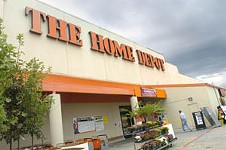Point Austin: A Taste for Apple
There's nothing surer, the rich get richer and ...
By Michael King, Fri., March 23, 2012
What do you give the company that has everything?
If you're the city of Austin, it would appear that $8.6 million is the magic number. That's the estimated cost in rebated real and personal property taxes of the proposed economic development deal with Apple Inc., to be formally considered this week by City Council. Apple is proposing to expand its existing campus into what it calls an "Americas Operations Center" on Parmer Lane; the project would invest $304 million (including the land purchase), directly creating more than 3,600 new jobs (more than doubling, to 6,700, the company's local workforce). In return, the city would rebate the estimated $8.6 million, over 14 years (subject to specific performance measures). In summary form, the city estimates the eventual financial "net benefits" to the city of the project over that period to be $14.5 million.
The city's contribution is not the big prize – rather, Apple stands to gain (contingent on local involvement) a pledged $21 million from the Texas Enterprise Fund, as well as a potential kickback from Travis County – $30-million-plus in all.
The initial official response was positive. At the March 15 special-called council meeting, there was some close questioning from the dais and some concern about construction safety, but no public opposition, and the general tone was reflected in the Greater Austin Chamber of Commerce VP Dave Porter's effusive description of "the deal of the decade." Even mayoral challenger Brigid Shea, who has made opposition to corporate incentives a signature issue, told In Fact Daily she supports the proposal as attracting "the kind of company we want."
If I had to guess, by the time you read this, Thursday's meeting will have anointed the deal, and Austinites can all start anticipating the day we can buy 2020 iPads on discount at the local Apple Outlet Store.
As if.
Rendering Unto Apple
However, not everybody in town thinks this deal is just Apple pie-dandy. There are considerable local misgivings about incentives in general, and more specifically about de facto partnering with Gov. Rick Perry and his economic priorities (anything for corporations, nothing for social services). And in recent days – following reports out of Phoenix, Austin's apparent competitor, that only Austin has a real shot – the question has been asked that if Apple's decision has already been made, why is the city considering incentives at all?
That issue was raised most acerbically by developer Ed Wendler Jr. and attorney (and former Travis County judge) Bill Aleshire, who in an email to council pointed to the Phoenix reports and wrote, "Granting a tax break to a company after they've chosen to come here is not an inducement for economic development, it's an unlawful (and stupid) gift of public funds." Asked about the charge of illegality, Aleshire referred me to the Texas Constitution (Art. III, Secs. 50-52a) which forbids grants of public funds for private purposes – with an exception (added in 1985) for economic development. As Aleshire interprets those provisions, incentives can only be used as an actual inducement for a corporate relocation; if the decision has already been made (or in fact, despite a company's "bluff," was never in doubt), Aleshire argues the entire transaction is unconstitutional. "If they're going to come here anyway," he said, "and you're just giving them a tax break – I consider that a gift," and therefore illegal.
The Constitution does not mention "inducements" or even "incentives," but Aleshire insists that without that interpretation, the ban on gifts would be rendered meaningless. Asked about this view of existing law, the city's economic development manager, Brian Gildea, answered that the same provision in fact authorizes economic development programs such as the Apple agreement as "a valid public purpose to enhance the state and local economy."
A Penny for Your Apple
This question is also open in the more notorious Formula One case of state incentives, with an attorney general opinion pending. Gildea told me that while competition is not a city criterion for incentives, companies generally consider alternative locations for major projects, and that in this case, Austin's chances for the Apple deal became stronger once negotiations began. "Austin is [Apple's] choice," Gildea continued, "assuming everything goes through." Were the city to pull its agreement, he said, the state and county incentives would also be lost – "and then they're going to go back to the drawing board."
Aleshire and Gildea indirectly agreed on one thing: This is a national issue. Aleshire suggested we need a national system of "truth in applications" for tax breaks, and Gildea argued that Austin must work to maintain a "level playing field": "If everybody in every community across the U.S. all at once said, 'we're not going to do incentives anymore,' then perhaps that would be the case."
I asked Gildea a simpler, more naive question: What does a company sitting on $100 billion in cash need with Austin's paltry $8.6 million? He pointed both to the ampler state incentives and the likelihood that Apple didn't get rich by not watching its pennies. "So in terms of providing best value to their shareholders, Apple presumably has a fiduciary duty as well."
And so, presumably, does the Austin City Council.
Got something to say on the subject? Send a letter to the editor.












